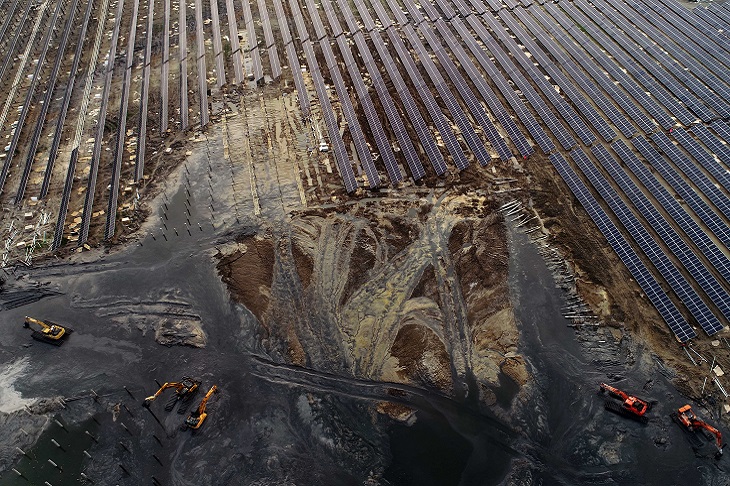Daniel Andrews has ripped away renewable energy’s cloak of economic and engineering respectability.
Unveiling his new energy policy for Victoria on 22 October, he began to rationalise renewables as the best option to replace coal-fired power but broke off mid-stream. Perhaps he was tired of the threadbare renewables-are-the-cheapest disguise Chris ‘Blackout’ Bowen still dons with peacock pride?
Exposing naked ideology, Andrews declared his government will ‘simply refuse to do anything other than replace [coal] with 100 per cent renewable energy’.
The renewables industrial complex has spent decades carefully weaving a cloak of respectability around its favoured technologies – solar, wind, and batteries. Its gossamer thread is simulated expertise, in which invented experts, backed by the apparatus of research and peer review, bury a foregone conclusion in a mound of pseudo-scholarship.
At the political end of this ideological fabric is the disreputable modelling of Labor’s Powering Australia Plan by Reputex.
Labor fought and won the election flaunting its conclusion that it would cut power prices for the average family by $275 by 2025 while achieving a 43 per cent reduction in greenhouse gas emissions with 82 per cent renewable electricity and creating 604,000 jobs. Too good to be true? Not a bit of it, said Labor, donning the Reputex modelling as a bullet-proof vest.
But the modelling was bogus.
Reputex assumed that no coal-fired power stations would close earlier than the dates that were then scheduled – late 2021. This was despite a key plank of the policy being to increase renewable generation from its current 20 per cent share to over 80 percent. Fossil-fuel generation would necessarily have to decrease from its 80 per cent share to less than 20 per cent.
This obvious contradiction was virtually ignored by the Australian media. Predictably, Reputex’s assumption proved false within months of being released when Australia’s largest electricity company AGL announced in February 2022 it would bring forward the closure dates of its two largest power stations, Bayswater in NSW, and Loy Yang A in Victoria. Less than a year on, earlier-than-scheduled closures for all Australia’s coal-fired power stations have been announced.
Reputex also assumed the 212 large emitters subject to the safeguard mechanism would respond to Labor tightening its screws by investing in emissions reduction technologies or by buying offsets, while maintaining output and employment. The alternative, that they cut output, reduce employment, or close altogether, was not modelled. This scenario was simply assumed not to occur.
Labor’s hapless Minister Bowen is to do deals with the facilities to be stretched on the rack of Labor’s safeguard mechanism to determine their breaking point. Meanwhile, they are already under severe strain from higher prices for electricity and gas. The Australian Workers Union has warned Prime Minster Albanese that 800,000 jobs are at risk.
Having assumed away the major downsides of Labor’s policies, Reputex added up the benefits – billions of dollars of presumed investment in renewable generation, transmission, and storage infrastructures, together with industry investment in emissions reductions, are cashed out as jobs and totted up. Reputex’s conclusion that Repowering the Nation would achieve Labor’s emissions reduction targets, lower electricity prices, and create jobs always was a fairy tale.
Too many in the Australian media let Australians down by believing the modelling unthinkingly. People believed it because they wanted it to be true. They want renewables to be the magic pudding of 21st Century Australia.
Reality has begun to show through with Labor’s mini-Budget of October 2022. Its commentary on inflationary pressures acknowledged the contribution being made by higher energy prices. The Budget forecasts assumed electricity prices rise 20 per cent in 2022-3 and by a further 30 per cent in 2023-4. Treasurer Jim Chalmers seems not to have realised this was a direct challenge to, if not a clear repudiation, of Labor’s pre-election commitment. For one so adept at spin and the contemporary politics of ‘the narrative’, he seems to have been caught flat footed – surprised, dismayed even, that post-Budget media headlines and interviews have been dominated by Labor’s breach of faith on electricity prices.
In response, Labor has turned to scapegoating and intimidation. Chalmers blamed the war in Ukraine, saying it has created ‘absolute havoc’ in energy markets. He peddles this as a discontinuity separating the present circumstances of Labor in government from those when Labor was in opposition, despite Labor repeatedly making a feature of its idiotic $275 price reduction commitment well after Russia’s February invasion of Ukraine all the way through to the election in May. Prime Minister Albanese took attack as the best form of defence, seeking to intimidate Dutton by blasting the former Coalition government for failing to deliver any of the energy policies it developed over its decade in office, which Labor pans as a decade of energy policy chaos. This obscures the reality that the Albanese Labor government itself has yet to deliver a single energy policy.
Already, the post-Budget fallout has shredded Resources Minister Madeline King’s month-old heads of agreement with the gas industry. To head-off calls for direct subsidies to blunt the impact of spiralling prices, Chalmers is now threatening intervention with ‘a broader range of options in ways beyond what might normally be considered’. Labor’s energy plans are yet to pass the Senate, where the Greens have warned the price of their support, at a minimum, is a ban on all new fossil fuel developments. It is hard to see how Labor will square this with its pre-election support for the coal industry and its commitments to our key customers and allies including Japan to be a stable and reliable supplier of energy.
The election of Albanese Labor will not end the climate wars. And neither will it end the energy policy chaos. The disconnects between the fairy tale promises of renewables-only ideology and the reality of our deep dependence on fossil fuels will smash policy after policy to smithereens.
Dr Michael Green has a PhD in Systems Engineering
Got something to add? Join the discussion and comment below.
Get 10 issues for just $10
Subscribe to The Spectator Australia today for the next 10 magazine issues, plus full online access, for just $10.


























Comments
Don't miss out
Join the conversation with other Spectator Australia readers. Subscribe to leave a comment.
SUBSCRIBEAlready a subscriber? Log in